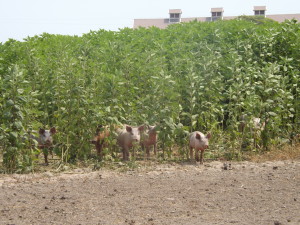Nash Huber and his team of young farmers work hard to maintain diversity on the farm, not only in soil biota or vegetable varieties, but in the farm’s product line. As the uncertainty of climate change increases, the value of diversity becomes more and more apparent.
Nash’s Organic Produce started out as a vacant lot or two of vegetables and berries in Dungeness in 1979. In the 1990s, however, the farm started to grow and that was when Nash began to put in place his vision of a diverse family farm. He grew up in south-central Illinois at a time when all farms were diverse and “organic,” even though they didn’t label themselves as such. He realized that a farm that had not only vegetables and fruit, but grain, seed and animals on the land, never wasted anything and could maintain higher soil quality, just as his grandparents’ farms did.
In 2007, Nash and Sam McCullough (the farm’s seed/field/equipment manager), were approached by WSU to do wheat trials. The trials were successful and today they raise several kinds of wheat, barley for animal feed, triticale (a cross between wheat and rye), rye, buckwheat, two kinds of dried corn, various legumes, and oats. For the first time this year, the farm is doing variety trials of quinoa.
Nash has always believed that the soil benefits when just the right amount of animals are on the land. The pigs are part of the nutrient cycle on the Delta Farm, happily munching on sunchokes (above) and grass in pastures, while fertilizing and aerating the soil.
Producing our own seed is also critical. Seed companies consolidate and discontinue varieties, or they genetically modify seed. At Nash’s, young farmers Sam, Chris Tipton and Waylon Barrett have worked to develop local varieties of seed for veggies like spinach, cauliflower, kale, cabbage, Brussels sprouts, carrots and more that are organic and adapted to our climate and soils.
So it can be said that Nash has achieved his vision, but only to a certain extent, as much remains to be done to fully integrate all the components of the farm. We are grateful to our hardworking managers and crew for balancing it all.

